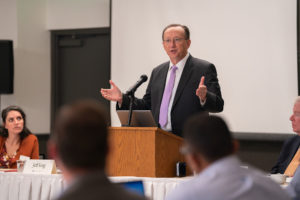
Why are we so worried and what are we so worried about? No matter how we answer those questions, all of us can admit Americans are worried. The unpredictable economy, the immigration crisis, crime waves in American cities, and a war in the Middle East have done nothing to relieve our stress. In fact, even before Hamas attacked Israel, an astounding 70 percent of Americans told the American Psychiatric Association they were anxious about their own safety or the safety of their families.
Anxiety in America is real. In fact, the number of prescriptions for anxiety medications jumped with an unprecedented spike around the time Covid-19 was declared an epidemic. So now, millions more Americans – including adolescents – are prescribed anti-anxiety medications. More than ever, people at work, people at church, and people at home are turning to medical intervention for their anxiety.
This article cannot, should not, and will not attempt to diagnose or offer medical advice about the serious mental health issue of anxiety. We can, however, remind one another that Jesus anticipated our state of anxiety. The Scripture speaks to the issue of worry.
Three different times in Matthew 6:25-34, for instance, in the heart of the Sermon on the Mount, Jesus advised against worry. He also suggested a remedy. He said, “So don’t worry, saying, ‘What will we eat?’ or ‘What will we drink?’ or ‘What will we wear?’ For the Gentiles eagerly seek all these things, and your heavenly Father knows that you need them. But seek first the kingdom of God and his righteousness, and all these things will be provided for you” (Matthew 6:31-33). Jesus taught that the alternative to worry is seeking God. Jesus wants worship over worry, and He prescribes prayer over panic.
Similarly, the Apostle Paul addressed the common issue of worry; and he also suggested prayer as the alternative. He said, “Don’t worry about anything, but in everything, through prayer and petition with thanksgiving, present your requests to God. And the peace of God, which surpasses all understanding, will guard your hearts and minds in Christ Jesus.” (Philippians 4:6-7)
The Prayer Solution
For the sake of clarifying the issue, let’s imagine a critic jumping at the opportunity to argue that these ancient verses do not apply to postmodern angst. Therefore we must ask: Do these biblical passages apply to our contemporary worry culture?
Paul made it clear that these verses do indeed refer to mental health challenges, and that prayer is a powerful tool for successfully coping with worry. Notice for example that Paul recommends prayer instead of worry, so that as a result we might experience peace that surpasses all understanding. He added that praying in the face of anxiety puts a “guard” on “your hearts and minds,” implying that prayer not only soothes the worries of the moment but provides a baseline defense against the onslaught of any future, worrisome circumstances. The word “guard” comes from a Greek word referring to military action. It describes the work of a sentry or garrison surrounding our minds to protect us, in this case, during panic attacks.
“Still,” our imaginary critic says, “prayer doesn’t work – it’s only a religious placebo.” Fortunately however, in answer to our illusory criticism, we note that even secular clinical research leads us full circle back to prayer. In recent years the psychiatric community has shown a renewed interest in religious belief as it relates to addressing the growing global problem of mental health deterioration. Some of the latest data, gathered and researched for at least a decade, demonstrates an unmistakable correlation between a person’s religious convictions and improved mental health. Gallup World Poll data from 2012-2022 find, on a number of wellbeing measures, that people who are religious have better wellbeing than people who are not.” No wonder Martin Luther reportedly said, “Pray and let God worry.”
The Depth of Prayer Needed
Jesus said faith the size of a mustard seed could move a mountain, but He was also known to pray through the night (Luke 6:12), for hours in the early morning (Mark 1:35-6), and sometimes for days at a time (Matthew 4: 1-2). In other words, when we face some challenges in life, if we follow the example of Jesus, our prayer will be long, determined and intense.
That’s the kind of prayer Paul seems to insist upon in Philippians 4:6. To combat anxiety, for instance, Paul uses an extraordinary four different words in one verse to describe various aspects of prayer. He said, “through prayer and petition with thanksgiving, present your requests to God. Prayer, petition, thanksgiving, and requests are not necessarily synonyms but rather different ways to attack a problem in prayer.
Anxiety is a powerful and crafty enemy, and it calls for the “big guns” of prayer to match its force. In other words, a “little talk with Jesus,” as the old song says, won’t suffice against paralyzing anxiety. Instead, it will likely require frequent and various kinds of prayer and a willingness to never give up. The frequency of our prayers needs to at least match the persistence of our worries!
Worry tends to occur when life’s events fill us with fear of unknown but dreaded outcomes. Naturally we want frightening circumstances to change, but for some reason we may feel helpless to make the changes. As a result we worry.
For those times, it’s helpful to remember the words of this familiar statement, “Worry is a conversation you have with yourself about things you cannot change. Prayer is a conversation you have with God about things He can change.”















